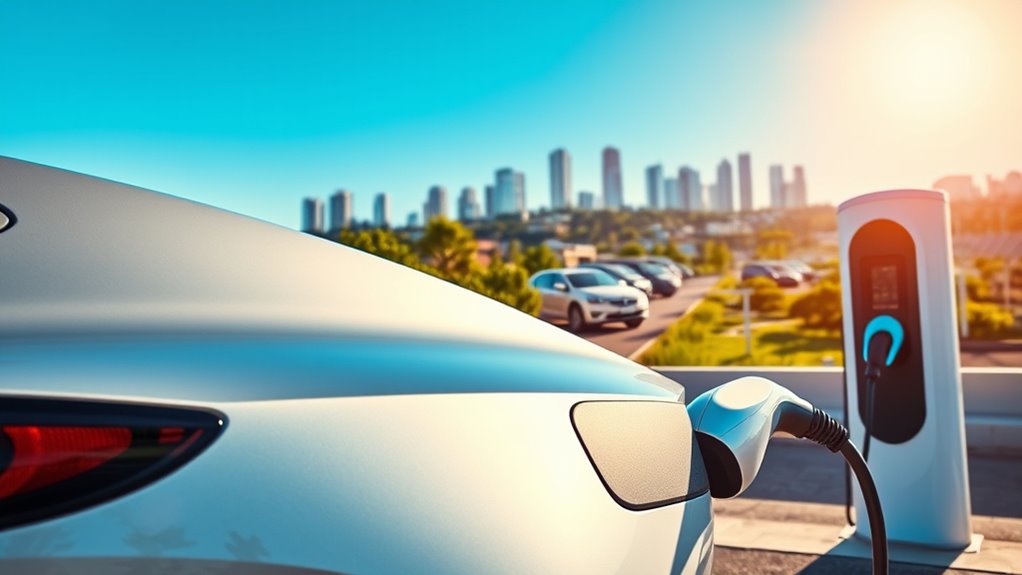Electric cars use advanced battery technology to power electric motors, giving you instant torque and a smooth ride. Unlike conventional cars, they run without gasoline, making them better for the environment. With benefits like lower operating costs and regenerative braking, these vehicles are becoming increasingly viable for everyday use. As battery technology and charging infrastructure improve, the future of transport looks bright. Stick around to discover more about the exciting world of electric vehicles.
Key Takeaways
- Electric cars use electric motors powered by lightweight lithium-ion batteries, providing instant torque for a smooth driving experience.
- Advanced battery technology allows for longer driving distances and ongoing innovations like solid-state batteries promise improved safety and charging efficiency.
- Charging infrastructure, including home and public charging stations, is expanding to support electric vehicle adoption and alleviate range anxiety for drivers.
- Electric vehicles offer lower operating costs, reduced environmental impact, and features like regenerative braking to enhance efficiency.
- The future of transportation is electric, with continuous advancements in battery technology and charging networks driving mainstream acceptance and sustainability.

As the world shifts toward more sustainable energy solutions, electric cars have emerged as a vital alternative to traditional gasoline-powered vehicles. You might wonder how these vehicles work and why they’re becoming increasingly popular. At their core, electric cars rely on advanced battery technology to power an electric motor, which drives the wheels. Unlike internal combustion engines, electric motors provide instant torque, delivering a smooth and responsive driving experience you won’t find in a gas-powered car.
Battery technology plays an important role in the performance and range of electric vehicles (EVs). Modern electric cars typically use lithium-ion batteries, which are not only lightweight but also offer high energy density. This means you can drive longer distances on a single charge compared to older battery types. As these technologies continue to develop, you’ll likely see even greater improvements in range and charging speeds. Innovations in solid-state batteries, for example, promise to enhance safety and efficiency while reducing charging times markedly.
Battery technology is crucial for electric vehicles, with advancements promising longer ranges and faster charging through innovations like solid-state batteries.
But what good is a fantastic car if you can’t charge it? That’s where charging infrastructure comes into play. As EV adoption increases, so does the need for accessible and convenient charging stations. Thankfully, many cities and regions are investing in robust charging networks, making it easier than ever for you to charge your vehicle at home, work, or on the go. You can find Level 2 chargers that provide a full charge overnight, and fast charging stations that can give you a notable boost in just 30 minutes. This expanding infrastructure is key to alleviating range anxiety, a common concern among potential electric car owners.
In addition to lower operating costs and reduced environmental impact, electric cars offer unique features like regenerative braking. This technology captures energy typically lost during braking, feeding it back into the battery. It’s a clever way to extend your driving range and make the most of every charge. Moreover, understanding how gear shifting on a bike can enhance your overall cycling experience can help you appreciate the nuances of vehicle dynamics, whether on two wheels or four.
As you navigate the world of electric vehicles, it’s vital to consider not just the car itself but the entire ecosystem surrounding it. Battery technology and charging infrastructure will continue evolving, making electric cars an increasingly viable choice for drivers everywhere. So, as you think about your next vehicle, keep in mind that the future is electric, and embracing this change is not just a choice—it’s a step toward a more sustainable world.
Frequently Asked Questions
How Long Do Electric Car Batteries Typically Last?
Electric car batteries typically last between 8 to 15 years, depending on usage and maintenance. You’re looking at battery longevity that can be quite impressive, especially with newer models. However, keep in mind that replacement costs can be significant, often ranging from $5,000 to $15,000. Regularly monitoring your battery’s health can help you maximize its lifespan, ensuring you get the most out of your investment before considering a replacement.
Can Electric Cars Be Charged at Home?
Absolutely, you can charge your electric car at home! It’s as easy as plugging in your smartphone. To set up home charging, you’ll need to take into account installation requirements, like a dedicated circuit and a Level 2 charger for faster charging times. Once you’ve got that sorted, you can conveniently charge your vehicle overnight while you sleep. It’s a simple way to guarantee your car’s always ready without the hassle of finding a public charging station.
What Happens if I Run Out of Charge?
If you run out of charge, your electric car will stop, leaving you stranded until you recharge. This situation can trigger range anxiety, making you worry about running out again. To avoid this, keep an eye on your battery level and plan your trips around available charging stations. If you do find yourself out of power, you’ll need to call for a tow or find a nearby charging station to get back on the road.
Are Electric Cars More Expensive to Insure?
Yes, electric cars can be more expensive to insure. Imagine cruising in your silent, sleek vehicle, but then you check your insurance costs and feel a jolt. The higher coverage options for specialized parts and enhanced safety features often drive up premiums. However, you might find discounts for eco-friendly vehicles or lower maintenance costs over time. Weighing these factors carefully will help you navigate the financial landscape of insuring your electric ride.
How Do Electric Cars Perform in Cold Weather?
Electric cars can struggle in cold weather due to battery insulation and the cold weather impact on their range. You might notice reduced efficiency as the batteries perform less *ideal* when temperatures drop. However, many manufacturers improve insulation to minimize these effects. Preconditioning your vehicle before driving can help maintain battery temperature, ensuring better performance. So, while you may face some challenges, advancements are making electric cars more reliable in colder climates.
Conclusion
In a world where electric cars are the superheroes of transportation, you can’t afford to be left in the dust of gas-guzzlers! These sleek, silent machines not only save the planet but also make you feel like you’re driving a spaceship. Imagine zipping past traffic while your friends stare in awe, wishing they were you! Embrace the electric revolution now, and you’ll be riding the wave of the future—where every charge feels like revealing a new level in the game of life!










